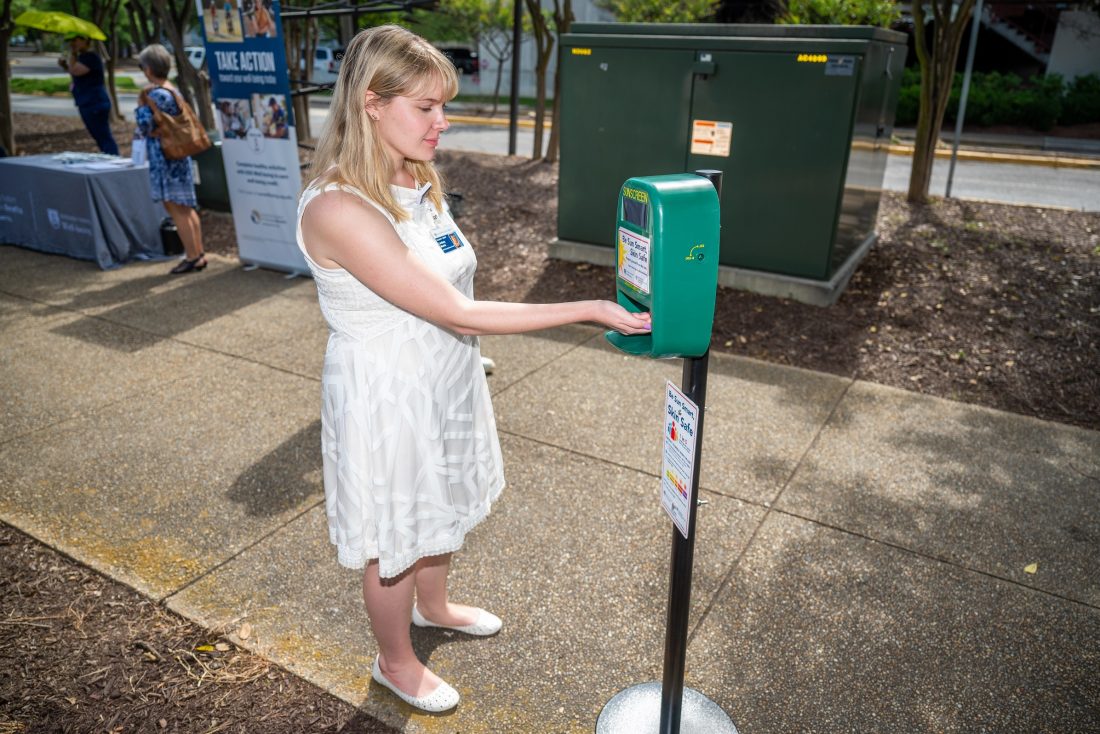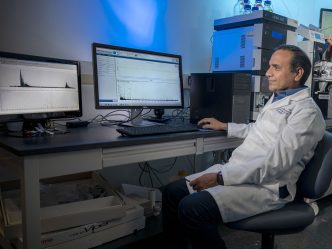Skin cancer is the most common cancer in the United States, with one in five people diagnosed in their lifetime.
With new cases of skin cancer climbing, members of Augusta University’s Well-Being program, along with the Georgia Cancer Center at the Medical College of Georgia at Augusta University, are taking action to protect students, employees and the public from a future skin cancer diagnosis by installing sunscreen dispensers across all Augusta University campuses in the Augusta community.
“There are three main types of skin cancer,” said Loretta Davis, MD, chair of the Department of Dermatology at the Medical College of Georgia. “Basal cell carcinoma may look like a nodule, a sore, an inflamed growth or irritated skin. Squamous cell carcinoma may appear as a crusty or scaly patch of skin with some redness, a firm tumor or a non-healing wound. Melanoma, the most dangerous form of skin cancer, often looks like a new mole but may develop within an existing mole.”
Augusta University is the first college or university in the University System of Georgia to have sunscreen dispensers installed on campus. The hands-free, battery-operated sunscreen dispensers make sunscreen applications easy. Through a grant awarded to the Augusta University’s Well-Being Committee, the University System of Georgia’s Board of Regents is investing in the health of AU employees and students.
“Although those with fair skin do have an increased risk, anyone with a history of excessive sun exposure can develop the disease. It is important for all of us to be aware and protect ourselves.”
Jorge Cortes, MD, director of the Georgia Cancer Center
Protecting yourself from the sun is the most effective way to combat skin cancer, but that does not require staying indoors. Use sunscreen with an SPF of 30 or higher every day — and reapply every two hours. The sunscreen inside the dispensers on the Forest Hills, Health Sciences and Summerville campuses has an SPF of 30.
In addition to sunscreen, people can protect their skin from sun damage by wearing sun-protective clothing such as hats, sunglasses and long sleeves when you can, and avoid the sun when it is strongest, between 10 a.m. and 4 p.m.
“The two major components of Sun Smart, Skin Safe include educational sessions provided by members of the Georgia Cancer Center’s Cancer Information and Awareness program and installing these sunscreen dispensers,” said Jorge Cortes, MD, director of the Georgia Cancer Center. “Although those with fair skin do have an increased risk, anyone with a history of excessive sun exposure can develop the disease. It is important for all of us to be aware and protect ourselves.”
Routine self-skin checks are the best way to catch skin cancers at an early stage, when they are still highly curable. If you have a personal or family history of skin cancer, it is also a good idea to have a full body skin examination by a board-certified dermatologist at least once per year.
“Although those with fair skin do have an increased risk, the shade of your skin does not protect you from skin cancer,” Davis said. “Anyone with a history of excessive sun exposure can develop the disease. Melanomas can occasionally develop in areas where the sun never shines. If you see a suspicious spot, make an appointment with a dermatologist in our department. We offer a team approach in the prevention, diagnosis and treatment of all types of skin cancer.”
 Augusta University
Augusta University





